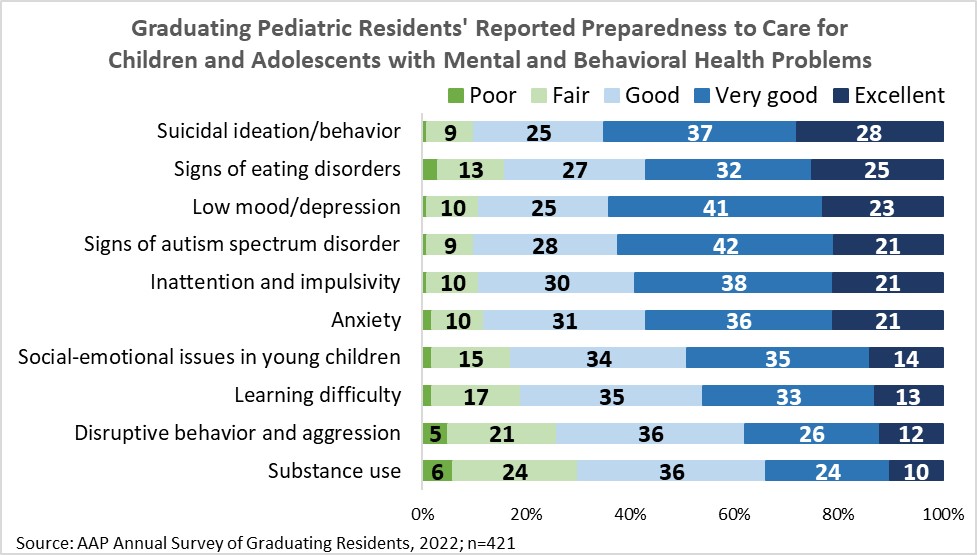Gottschlich E, Kist T, Haftel H
Presented at the 2023 Pediatric Academic Societies Annual Meeting
Background: Mental health problems among children and adolescents have worsened during the COVID-19 pandemic. Pediatricians’ experience addressing child and adolescent mental health needs begins in training.
Objective: Examine recent graduating pediatric residents’ training and preparedness to provide care for children and adolescents with mental health problems by residency program characteristics.
Methods: National random sample of 1,000 US pediatric resident graduates from the 2022 AAP Annual Survey of Graduating Residents; 428 (43%) responded. Residents rated their program on how well it prepared them (5-point scale, “poor” to “excellent”) to care for children and adolescents with mental and behavioral health needs overall and for 10 problems. Respondents reported whether there was a mental and/or behavioral health professional on-site at their continuity clinic and if they completed an educational unit (or rotation) in child and adolescent psychiatry in residency. For mental and behavioral health needs overall and 4 common problems (suicidal ideation/behavior, low mood/depression, anxiety, and signs of eating disorders), chi-square tests examined variation by residency training program characteristics.
Results: 61% reported an on-site mental/behavioral health professional at their continuity clinic; 33% completed a child or adolescent psychiatry educational unit/rotation. Half rated their program as excellent (17%) or very good (34%) in overall preparation to care for mental health needs (32% good, 14% fair, 2% poor).
Six in 10 residents reported excellent/very good preparation in caring for patients with suicidal ideation/behavior (65%), low mood/depression (64%), signs of eating disorders and anxiety (57% each); Figure. Fewer reported such preparedness to address disruptive behavior and aggression (38%), and substance use (34%).
Preparedness reported for the 4 common problems varied by some program characteristics, including hospital associated continuity clinic and program size (Table). Residents from larger programs reported stronger preparation to care for patients with suicidal ideation/behavior (53% small vs 72% extra large, p<.05) and signs of eating disorders (42% small vs 74% extra large, p<.001).
Conclusion: Pediatric residents graduating in 2022 felt most prepared to care for patients with suicidal ideation/behavior and low mood/depression and least prepared to care for those with substance use. Hospital associated continuity clinic or a larger program size increased preparedness to care for patients with suicidal ideation/behavior and eating disorders.
Figure 1. Graduating pediatric residents’ reported preparedness to care for children and adolescents with mental and behavioral health problems

Last Updated
05/22/2023
Source
American Academy of Pediatrics